#Delos island Greece
Photo
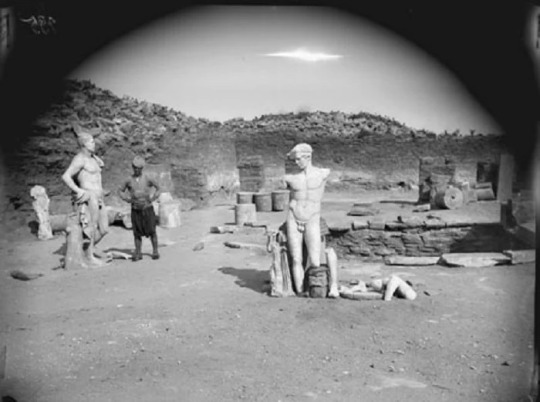
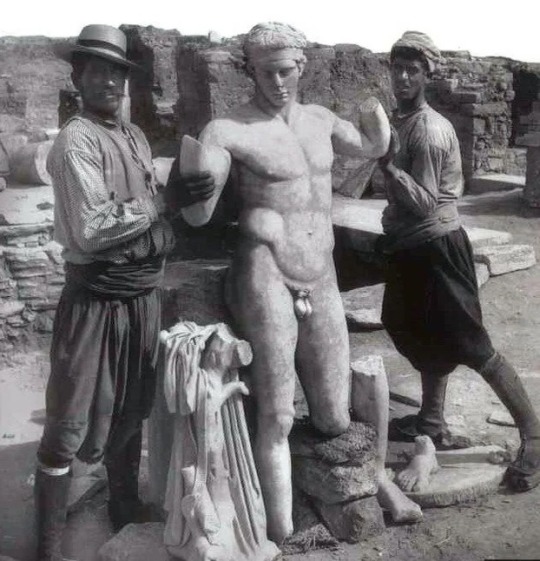

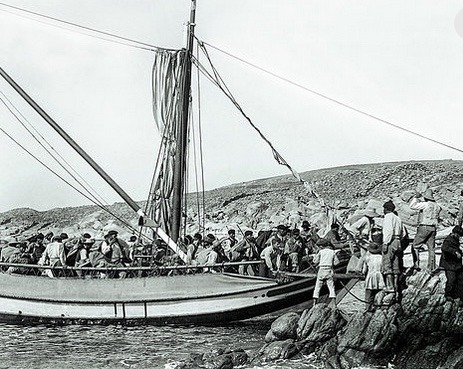

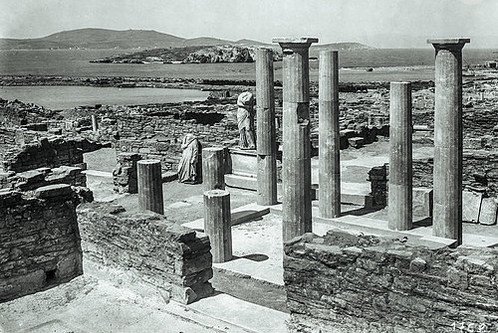
Rare Photos Show First Excavations at Sacred Greek Island of Delos
Rare photographs of the excavations at the Greek Island of Delos from the 19th Century have come to light in a book by French archaeologists.
The book Delos 1873-1913 sheds light on the challenges facing the scientists and other skilled and unskilled workers who unearthed ancient monuments and artifacts in one of most important mythological, historical, and archaeological sites in Greece.
Its claim as the birthplace of Apollo gave Delos a strong religious identity that lasted all the way until Byzantine times.
Over the centuries, Delos was truly a cosmopolitan center with a diverse population that included people from all around the Mediterranean, but in 88 BCE, the Romans razed the island during their war with Mithridates (an ally of the Athenians who controlled the island), a calamity Delos never recovered from.
Excavations began on Delos in the 19th century
The French School of Athens (FSA) in 1873 sent archaeologist A. Lebègue to begin work on excavations on Delos.
Until the First World War, on the instigation of T. Homolle and then M. Holleaux, the emphasis was on the clearing of large areas in the Sanctuary zone and on the northern slopes of Cynthus; however, the rest of the island was not neglected.
Several years apart (1894 and 1907), two archaeological maps of the island were drawn up while a study of its physical geography was successfully completed by the geologist L. Cayeux (EAD IV).
From 1903 onwards, the excavations enjoyed annual financial support from Joseph Florimont, Duke of Loubat (1831-1927), a rich American philanthropist and foreign corresponding member of the Academy of Inscriptions and Belles-Lettres.
This major contribution to work in the field was complemented in 1920 by the creation of a Greek epigraphy fund to support the institute from which the income was used for the publication of the Choix d’inscriptions de Délos by F. Durrbach (1921) and the Corpus des inscriptions de Délos.
From the 1920s onwards, the efforts of the school’s members focused on the study of monuments, batches of equipment and inscriptions discovered in the previous decades, and exploratory research concentrated more on buildings than groups of monuments.
By Tasos Kokkinidis.
#Rare Photos Show First Excavations at Sacred Greek Island of Delos#archeology#archeolgst#ancient artifacts#history#history news#ancient history#ancient culture#ancient civilizations#ancient greece#ancient greek history#ancient greek art
341 notes
·
View notes
Text

Day 8 of @bweirdart s inktober prompt list, which is ‘past’.
#ok SO#Dara grew up on Delos#which is the island Artemis. d#and Apollo were born on#bcs their mum is Asteria#which is the titan that turned into the island to escape Zeus and the titan of shooting stars and dream magic#Dara was just a toddler running around an island#with their cat and their peach trees and the occasional dead Greek#as shown above#inktober#October#autumn#Halloween#inktober art#inktober prompt#greek mythology#Ancient Greece#Oc art#if u couldn’t tell Dara is a Percy jackson Oc#but I’m tryna pull them out of that a bit for inktober
12 notes
·
View notes
Text
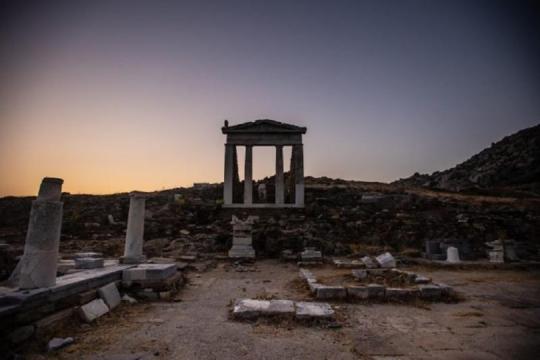
Το εμβληματικό νησί της Δήλου,κοσμοπολίτικο κέντρο της Μεσογείου κατά την αρχαιότητα σήμερα πια ανοιχτό μουσείο...
#Δήλος#Κυκλάδες#νησί#ιερό νησί της Δήλου#αρχαιότητα#ιστορία#Delos island#Greece#antiquity#ancient history#ancient Greece#open museum#ruins#Cyclades#Cycladic civilization
7 notes
·
View notes
Text

Aug 2023: Delos Island, Greece
#Delos#Delos island#Greece#summer#summer evening#golden hour#sunset#heritage site#archaeology#Vienna#Vienna Juliet#Vienna Macdonald
2 notes
·
View notes
Text
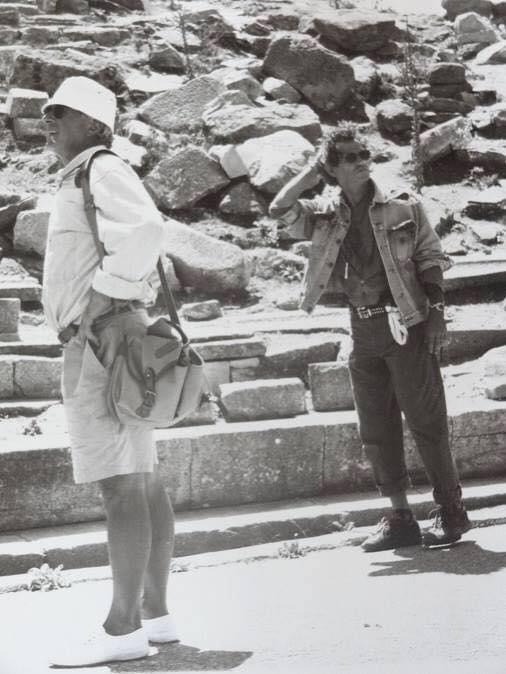
Keith Richards, founding member and guitarist of the Rolling Stones, in Delos
August 1993
What was Keith Richards of the Rolling Stones doing on Delos? Good question! Minas took him there. One evening in August, Keith arrived on Mykonos with his wife Patti Hansen and his daughters Theodora and Alexandra. He had been invited to stay at a house designed by Minas next to his own residence. The ever-hospitable Minas took a bowl of fruit for the children and immediately hit it off with Keith. After that, Keith would go to Minas’ house where they exchanged stories over Jack Daniels and cigarettes. Keith had come to the island because he had heard in Dublin, where he had been previously, that there was going to be a meteorite storm. He asked for the lights to be switched off and every so often, gazing at the sky, he would say “Come in God, give us some, come in.”
Keith was quick to understand Minas and his work since he too had studied fine art before getting involved with music, but as he himself stated with a heavy dose of irony, from that experience he kept only what he had learned about PR and marketing. On one occasion, feeling great enthusiasm for Minas, he said: “I know what you do. You make music with shapes”, before leaving his pocket knife on the table as a token of friendship.
One day, Keith saw some photos of Delos and already deeply impressed by the dazzling white marble sundial set in the rugged landscape at Minas’ house, he asked his friend to take him to the sacred island. It was 15 August. They went to Delos in a rented fishing boat skippered by one of the villagers who had no idea who the foreigner was.
When they reached the island and went to the museum, the employees immediately recognized Keith and gave him a tour. What impressed him most however was the ancient theatre, where the photos were taken. After being photographed everywhere and after sitting for a while in every possible place to feel the energy, he said to Minas: “The ancients built theatres specifically for their plays and music and we’re still performing concerts in football stadiums!”
He didn’t want to leave Delos at all and when they finally managed to get him back to the boat, he turned one last time, looked at the island’s smoothly rounded rocks and – clearly influenced by the high winds – said: “The ecologists tell us that the earth is fragile. The earth isn’t fragile. We are.”
Source: lesoleilfoundation.com
#keith richards#the rolling stones#greece#delos#europe#archaeological sites#old photos#black and white photo#b&w#cyclades#cycladic islands#greek islands
25 notes
·
View notes
Text
Delos - the Greek Island where you are not allowed to stay overnight.
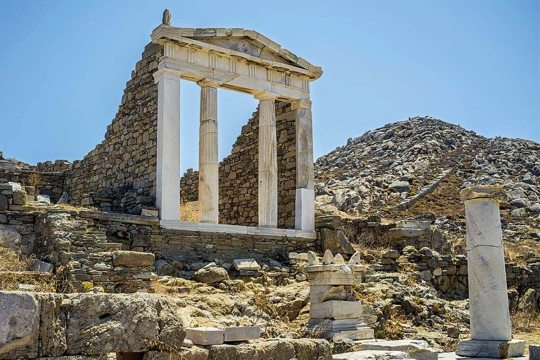
I want to talk about one of my favourite Greek islands, Delos. Located just a few kilometres southwest of Mykonos, Delos is a small island that packs a big punch.
However, no one is allowed to stay overnight on Delos as it's an archaeological site and a protected area. Visitors are only allowed to stay on the island during the day and have to leave before the last ferry departs. This is to preserve the island's fragile ecosystem and protect the archaeological sites from damage or vandalism.
Getting to Delos is easy - just hop on a ferry from Mykonos, and you'll be there in no time. The island is only 3 km long and 1.5 km wide, so it's perfect for exploring on foot. Delos is famous for its ancient Greek ruins, which are a UNESCO World Heritage site. The island was once the centre of the Cyclades, and it's said that the god Apollo was born there.
So, what can you do on the island? First up, you have to visit the ancient ruins. The archaeological site is extensive, and you can easily spend hours wandering around and exploring. Be sure to check out the Terrace of the Lions, one of the island's most famous landmarks.
Next, head to the beach. Because the island is small, there are few, and they tend to be rocky, but they are worth visiting.
Finally, take a stroll around the island. Delos is small enough to easily walk around in a few hours. Along the way, you'll see beautiful views of the sea and the surrounding islands.
#goexploregreece#goexplore#explore#exploregreece#exploretheworld#wanderlust#greece#greek islands#greekislands#mustvisitplace#mustvisit#musttry#mustsee#top tips#travel tips#traveltips#delos#cyclades#ancient site#ancient buildings#ancienthistory#ancientgreece#mythological#travel
2 notes
·
View notes
Text
“On charts they fall like lace,
Islands consuming in a sea
Born dense with its own blue:
And like repairing mirrors holding up
Small towns and trees and rivers
To the still air, the lovely air:”
From “Delos”,
by Lawrence Durrell
3 notes
·
View notes
Photo
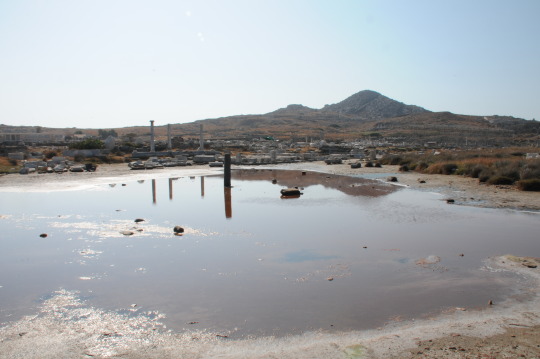
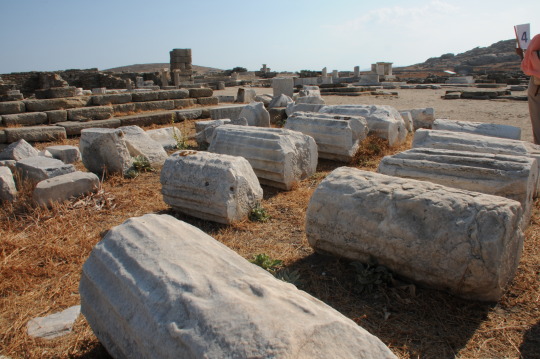
2022.8.11
Delos
Mykonos, Greece
#Mykonos#Greece#Delos#Ruins#greek ruins#greek isles#greek islands#archeology#travel photography#travel#photography
0 notes
Text
Island Hopping - Delos & Mykonos
Island Hopping – Delos & Mykonos
We really, really wanted to visit Delos, a super important archealogical island close to Mykonos. What we really, really didn’t want to do was stay on Mykonos for two nights on account of it being obnoxiously expensive. The kind of expensive whereby you can only sob as you hand over anything north of €120 for a single night’s accommodation for the absolute cheapest bed you could find which was…
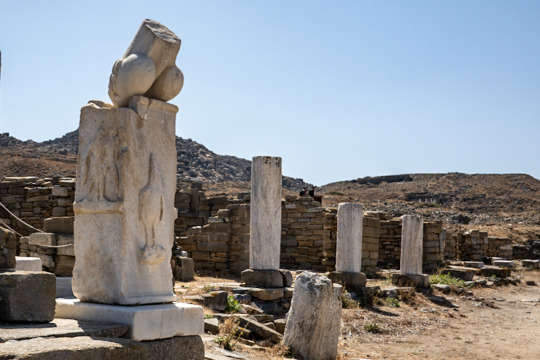
View On WordPress
#Adventure#Ancient History#Backpacking#Boat Tour#Cyclades#Delos#Greece#Greece 2022#Island Hopping#Mykonos#South Aegean#Travel#Wanderlust
0 notes
Text

Archaic Phallus (Southern Pillar of the Stoibadeion - Temple of Dionysus). Island of Delos, Greece. 1937.
235 notes
·
View notes
Text

We're so used to referring to Apollo and Artemis as Divine Twins, but did you know that the earliest known Ancient Greek sources do not explicitly denote the two as being twins?
That isn't to say one text depicting a myth is more correct than the other - but I so rarely see mentions of Apollo and Artemis as not twins that I find it all the more dear.
There is beauty in Solar and Lunar twins - but I also see the same beauty in siblings who are not predetermined to be each other's mirror by the fact of birth.
The first mention of Apollo's name in the Ancient Greek texts is in the Homeric Hymn to Apollo (3), trans. by Hugh G. Evelyn-White:

Here's a link to the original.
They are not explicitly called twins and They have different birthplaces: Apollo's birthplace is Delos, Cyclades - Artemis is born in a place named Ortygia. It should be stated that only Apollo's birth is given any sort of detail, and it is unclear where Ortygia was.
Ortygia (center of modern Syracuse named after the Greek word for quail) in Sicily has been known to Greek colonizers since around the 8th century BCE, Homeric Hymns date to approximately the 7th-6th century BCE. It's possible that Artemis was born there. In this case, the locations are separated by the Ionian sea and a large part of Greece. Delos is a small island to the North from Naxos and right at the Southern ridge of Mykonos, Ortygia in Italy is the Eastern part of Sicily:
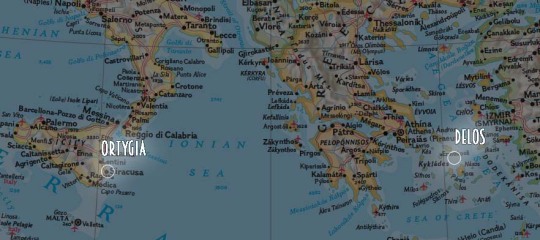
Ortygia could also be attributed to a large number of other places. Strabo (63 BCE - 24 AD) in his Geography (10.5.5) stated that Ortygia is but an old name for Delos or for Rheneia, a small island in the Cyclades:
Rheneia is a desert isle within four stadia from Delos, and there the Delians bury their dead; for it is unlawful to bury, or even burn, a corpse in Delos itself, and it is unlawful even to keep a dog there. In earlier times it was called Ortygia.
Though earlier in the same book (6.2.4) he argues that Ortygia might also be in Sicily. He gives a detailed explanation of what we now know as the Old Town of Syracuse:
Ortygia is connected with the mainland, near which it lies, by a bridge, and has the fountain of Arethusa, which sends forth a river that empties immediately into the sea.
— The Geography of Strabo, Books 1-5 translated by Hamilton and Falconer
Ortygia is also a placename attested to different parts of Greece. For example, in Homer's Odyssey (5.123), a much earlier text, Artemis kills Orion in Ortygia and the place is not anyhow noted to be connected to Delos:
<...> until in Ortygia chaste golden-throned Artemis
attacked with her painless darts and killed him.
— The Odyssey of Homer, translated by James E. Huddleston
Hymn to Apollo is not the only Ancient text predating any mention of "twins" that did not specify that the two were born at the same time. Hymn to Artemis (27) calls the Gods a brother and a sister while Hymn to Artemis (9) indicates that They were raised together (ὁμότροφον) without a notion of the circumstances of Their birth. Those are the earliest sources we know of, but there were many other authors and traditions that followed, some of which were:
Homer in the Iliad makes Them a son and a daughter of Leto
Hesiod mentions them being born from the same mother
Neither describe the two as twins.
Apollodorus in his Bibliotheca (1.4.1.) makes Artemis be a first-born so She serves as a midwife for Apollo
Plutarch in Pelopidas states that Apollo was born in Tegyra, Boeotia
Some later sources (Callimachus, Servius) consider Artemis to be first-born while some (Hyginius) do not specify on time of birth.
The first - and most prominent - author to speak of the Divine Twins is Pindar (518-438 BCE) in his Olympian odes (3.35), here he refers to Them as twins of Leda. At the same time, in the Nemean odes (1.1) he calls Ortygia in Sicily Artemis' birthplace and "sister to Delos" (might be metaphorical, as in sister-state). Orphic Hymn 35 to Leto (1st-3rd AD?) also calls Them twins.
It should probably also be noted that the cult of Artemis and the cult of Apollo are not always interconnected. While some locations (such as Delos and Ortygia, Sicily) have a history of implementing both Deities into the same votive tradition, some (Didyma, Claros) have worship of the Gods completely disconnected from each other. It is likely worth another post, but worship of Apollo didn't necessarily imply His sister, and vice versa.
With all of this being said, I do not believe that one version of the story is above another. And while I do find it fascinating - and logical - that the idea of Apollo and Artemis being twin-Deities has taken root, I do appreciate other, older and not, versions of the same legend.
#HISTORIA 📔#I have an insane aesthetic rule with golden text but. I hope you can see underlined text; those are all links.#greek mythology#greek gods#artemis#apollo#artemis deity
94 notes
·
View notes
Note
i love thinking about apollos anatolian origins 😵💫
It stews in the back of my head too :3
There was this really good podcast on Spotify I found about Ancient Greece, and I listened to his Apollo episode first (because I honestly can't stomach the ones who paint him as 'terrible assaulter'/'epitome of the patriarchy'. Can't stand it. Seriously, there was this so-called 'feminist' mythology podcast i found and I Noped out of there as fast as I could - she didn't even mention Eros's involvement in the Daphne myth! She immediately went 'Apollo: the man who doesn't know the meaning of No' and I was like I'M OUTTA HERE.)
(It's very hard to find good Apollo content out there when you have educated yourself on what he's actually like :( )
(At least you immediately know those people didn't do their research shrug)
Thankfully, this one had a really good, really in-depth discussion about Apollo; his origins, his domains, his myths, ect!
COMPLETELY FREE OF BIAS TOO! HE JUST GIVES YOU THE FACTS, THE SYMBOLISM OF THE MYTHS, HOW THE CULTURE INFLUENCED THEM, ECT!
On my first (and only rn) listen I was like "damn i need to take notes on this sometime" that's how in-depth it is!
Here's the episode link if anybody is interested, btw!
What's cool is that he said that before Apollo came along, oracles and the like weren't as common in Greece - they existed, because Gaea was a thing - however, when he was imported in (possibly also with Leto! She has Anatolian origins too!), oracles became more of a thing as Apollo's popularity skyrocketed!
If you look at the number of Oracles Apollo had, you'd also notice that a lot of them are in Anatolia (Turkey today)!. Didyma, Miletus, Claros, ect ect! I think this just adds to the theory that Apollo's main origins come from Anatolia! When he moved to Greece, oracles came with him!
Which is so cool because in my drafts I currently have a picture of a webchart I made of Apollo's (many) domains, and I narrowed down the ones I think are his Big Ones - and Prophecy is one of them.
Very cool that Prophecy has always been part of him <3
Also, Apollo has many cities he is the patron of in Anatolia - Troy is obvious, but the island of Tenedos was his too (his son Tenes founded the city there), and he was the patron of Miletus (the city where he met Branchus btw for my Branchus fans out there)!
And going to Leto real quick, her migration from Anatolia religion to Greece's is probably represented in the Hymn to Apollo! Sometimes myths about wandering from place to place were meant to symbolize the importation of a god (Aphrodite floating ashore of Cythera, for example), and Leto...well, she was doing a lot more than the typical wandering in the hymn, but it still fits!
Some versions say she was guided to Delos by wolves from Hyperborea, others say Boreas helped her escape Python, still others claim a rooster was present when she finally was able to give birth and thus became her sacred animal (also she apparently gave birth to Apollo as a wolf? I don't quite remember which version says that but it's something I've heard XD).
Also Delos was very self-conscious about Apollo being born on it because it was afraid he would judge it for not being up to typical island standards XD
Moving to Apaliunas now! He's a Hittite god, but I haven't been able to find out of what :( The main piece of evidence we have of his relation with Apollo is Troy - Apaliunas was the god of Wilusa, who has been found out to be another name for Troy! There was a treaty signed between Wilusa and another city, and the representative of Wilusa's name was commonly translated to "Of Ilios" - and Ilios was another name for Illium, aka Troy.
(Fun fact: The son Apollo had with Ourea was named Ileus, after Troy! They are but a footnote in mythology but I made them Important in my Troy fic XD)
Plus, Apaliunas's name was connected to the Hittite reflex of Apeljōn, which scholars have theorized to be an early form of Apollo's name - remember Apollon? :D
Apollo also has connections to various other deities - the Italian Etruscan god Apulu (Aplu), the Celtic god Grannus, his Egyptian equivalent is Horus and his Phoenician one is Resheph! He's also been identified with Baldur from Norse mythology.
Apollo be wearing that trenchcoat, and he is wearing it well XD
#the oracle speaks#ramblings of an oracle#apollo#apollo deity#greek myths#greek history#greek myth#greek gods#greek mythology#ancient greece
47 notes
·
View notes
Text
Anubis Deity Guide
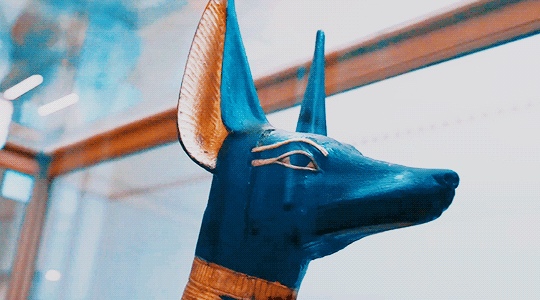
Who is Anubis?
Depicted as a being with the body of a man and the head of a jackal, Anubis is the Egyptian god of the dead. He is also the god of mummification, lost souls, and the helpless. Anubis is one of the oldest gods of ancient Egypt and was possibly derived from the older jackal god Wepwawet, as the two are often conflated.
Due to his role as god of the dead and afterlife, he also held domain over justice and has been depicted holding scales to determine the “weight” of the person’s soul.
Parents and Siblings
Ra (his father originally)
Hesat (mother)
Bastet (sometimes referred to as his mother)
Osiris (his father in later stories)
Isis (his mother in later stories)
Horus (brother)
Babi (brother)
Sopdet (sister)
Wepwawet (brother)
Bata (brother)
Lovers or Partners
Anput (female counterpart of Anubis)
Children
Kebechet
Epithets
Anpu
Tpy-djuf - He Who Is upon His Mountain
Lord of the Sacred Land
Khentyamentiu - Foremost of the Westerners
He Who Is in the Place of Embalming
Guardian of the Scales
Notes
The name “Anubis” is the Greek form of the Egyptian name “Anpu” which means to decay.
The Greeks associated Anubis with Hermes, the Greek god who guided the dead to the afterlife. The two would be joined together to create Hermanubis, making him more accessible to non-Egyptians.
He was also worshiped in Greece on the island of Delos.
Anubis was said to be the creator of embalming.
His epithet “god of the westerners” means “god of the dead” as the Egyptian term for departed souls was “westerners”. This was because it was said that the afterlife was towards the west, the direction of the sunset.
Anubis was often depicted as a black Jackal or other canine or as a human with the head of a black jackal/canine. The black coloring was likely a nod to the discoloration of a dead body as well as the fertile silt of the Nile.
Anubis was regularly invoked for protection as well as vengeance.
The center of Anubis’ cult was set in Cynopolis, or “the city of the dog” but there were shrines sprinkled throughout all of Egypt.
There is a place that was known as Anubeion, where a shrine and a cemetery of mummified dogs and jackals were discovered east of Saqqara.
Originally Anubis’ father was Ra, though as Osiris gained popularity Anubis’ story got mixed up and he became the son of Osiris and Nephthys. In this later story, Nephthys tricked Osiris into having sex with her and became pregnant with Anubis who she soon abandoned for fear that her husband, Set, would find out about the affair. Osiris’ wife, Isis, found Anubis and adopted him.
In other stories, Anubis was said to be the son of Set or Bastet.
Modern Deity Work
Correspondences
Most of these are modern correspondences I've seen across many
Rocks/Stone/Crystals
Obsidian
Smoky quartz
Onyx
Jet
Labradorite
Herbs/Plants
Cypress
Cinnamon
Myrtle
Lotus
Animals
Jackals
Canines
Symbol
Ankh
Offerings
Items or items with images of the things listed above
An altar
Beer
Bread
Candles
Cold water
Dark chocolate
Acts of Devotion
Clean up local cemeteries (don’t try to clean graves unless you have the correct supplies and have been given permission to do so)
Leave flowers on old graves of strangers.
Volunteer or donate to local dog shelters.
Research him
Get involved with spirit work
Volunteer at or donate to orphanages, as he is the patron of lost souls and orphans
Get into herbology; his priests were skilled herbal healers and dealt with many herbs during the mummification process
Practice divination; in the Papyri, Anubis is noted to be an intermediary for divination.
As always this is not an end-all-be-all list. If you have different correspondences or devotional acts in mind then that’s totally fine!
References and Further Reading
Offerings to Anubis - Patheos
Anubis - Egyptian Museum
Anubis - World History
Anubis - Britannica
Anubis - Ancient Egypt Online
Death Dogs - Jackal Gods of Egypt
Devotees and Followers to check out:
@crystalgerblin-enchantress
522 notes
·
View notes
Text
Apollo, Leto, Hera and Zeus: a story of dragons, families, reputation and politics
The Homeric Hymn to Pythian Apollo presents a pretty cool story about the Most Greek of the Greek Gods, He who shoots the Silver Bow, the god Apollo, whose birth is recounted in the hymn whose main characters act in a complicated theological, familial and political web. The gods and the monster are part of the complex game of politics and wit that the chief gods like to play, and each one of them has their set of cards to play.
Leto and Apollo: Devoted Mother and Beloved Son
Apollo is chronologically Leto’s second child, born on the island of Delos, which is (depending on who you ask) also the body of her sister Asteria, who turned into an island to escape the advances of the King of the gods. The place of birth of the baby god places Leto’s delivery under a strictly familial context and the protection of every matron figures in his life, since even his sister Artemis is said to have helped to bring him to the light. Leto did everything she could in order to be able to give birth to her children, travelling to every island of mainland Greece to look for a suitable place. The relationship between Leto and her son is one of deep love and devotion, the same one that brought him into the world, and the one that he would defend with all his divine strength.
Apollo and Zeus: Mirrored lineages and Decked Destinies
Apollo’s story is almost a perfect mirror of Zeus. Their stories are eerily similar when put in juxtaposition. Both of them are the sons of the almighty ruler of the universe, born in difficult circumstances, with Zeus being born at risk of being eaten by Kronos and Apollo being born under Hera’s restriction, who grow up to have a large number of both male and female lovers and become beloved by the Ancient Greeks who build them a lot of temples, one of them being famous for an oracle (Dodona for Zeus, Delphi for Apollo). These two gods cement their power by defeating a monster with whom the goddess Hera has a link with (Typhon and the Dragoness to whom Hera have Typhon to be raised by, as well as to chase the pregnant Leto). However, one element is missing from this almost perfect copy of the King of the gods: Apollo never succeeds his father by the classic overthrowing myth of the succession cycle, both because of the fact that Zeus reigns supreme over the universe and is its definitive leader, but also because of Hera’s meddling (I’ll discuss that later). As a result, Apollo is an imperfect mirror of his father, a reflection but not a twin of Zeus, and as such he does not get to make decrees over the whims of fate like Zeus Moiragetes, but instead merely speaks his prophetic will and gets most of his prophetic powers from him.
Hera and Leto: Political Rivals in the Succession Game
Leto was Zeus’s sixth wife, the one that came just before Hera, yet she conceived her children after her separation from Zeus, a feat which would make any former queen proud that she had not been left behind and is still desirable enough for the king to grant her favour, and would allow her a special place within his heart, a place special enough for her to get privileges and share some of them for her children. This almost concubinal relationship between Zeus and Leto is a direct threat to Hera’s rank as sole queen and equal of Zeus, which led her to prevent Leto from getting the privileges she could get if she ever had children, as it would tie her to Zeus’s household forever, as well as make him feel more kindly towards any children they may sire by forbidding her from giving birth anywhere in mainland Greece, making the relationship between Hera and Leto seem to be more akin to political rivalry and defense of her title than just plain jealousy which people usually associate with Hera.
Hera and Apollo: Branded Forevermore
Apollo, the mirror of Zeus, the beloved son of Leto, was born from a loophole in Hera’s decree, and probably the best possible god to designate as an heir for Zeus. However, the birth of this very important and powerful deity is a direct threat to Hera’s position, as Zeus may choose to look more kindly upon him and his mother than her and her children, which is the exact same reason as to which she cursed Leto in the first place. Through the trial and humiliation of being rejected by every place on earth attached to the sea floor and having the previous wife of Zeus give birth on a barren rocky island while simultaneously being ruthlessly chased by a monster, Leto is publicly declared obsolete by Hera and any children that may come by her and Zeus is immediately branded as illegitimate, a blazing and painful reminder of the one whom Zeus chose to share his bed with and of the definitive queen with divine prerogatives that entitle her to declare who enters Olympus or not. Apollo enters Olympus eventually, but not before slaying the monster sent by Hera to hunt down his mother and raise the dreaded Typhon who would serve as the ultimate challenge to Zeus’s rule, effectively taking revenge on him for the transgression that was the lone birth of Athena, and reaffirming his power in that special way only she knows.
19 notes
·
View notes
Note
There's these two fem!percy x apollo fics where she somehow gets stranded in time. More specifically the ancient Greek times. Like. Pre Helen of Troy.
After seeing the borderline "dead dove do not eat" mess u made with TNACAU (I love that mess deeply by the way... 😉)
What do u think a modern percy stranded in ancient times would be like? Poseidon's first daughter. The most precious pearl in the sea really. A new hero. Deadly. Fighting in this Strang unfamiliar (modern) way. With her strange speak and disrespectfull ways.
She'll be there two seconds before Apollo snatches her ass and locks her up on Delos again. Just 2 seconds. And that's me being generous.
Yes, I saw them! Honestly, hats off to anyone who writes these fics set in Ancient Greece, I can't imagine all the research that goes into it!
I think Percy would absolutely hate it there. The sexism, the attitudes, the gods especially. Percy would find some remote island and just hang out there. Seriously, as a woman you're twice as cautious of the gods because of the r*pe myths. I don't even think she would be wary of Apollo as much as she would try to avoid Zeus the most.
21 notes
·
View notes
Text
Day Two - Apollo

Apollo is arguably one of the most complex gods of Greek mythology. He is the god of many things, such as; the sun, archery, music, poetry, art, medicine, plagues, knowledge, light, and oracles.
His father is Zeus and his mother is a titan named Leto. He also has an older twin sister named Artemis. He was born on the Greek island of Delos.
Apollo was the leader of the nine muses (more on that coming in a later post!), and he directed their choir, hence being the god of music and art. He was also the epitome of male beauty in ancient Greece.
Hermes created the lyre and gave it to Apollo, and the lyre can be seen as a symbol of Apollo. He is often depicted with the lyre. Hymns to Apollo were called paeans.
Apollo has many lovers, resulting in many offspring. His children were scattered across the world. Majority his children inherited his beauty and also his skill from the many domains he has.
Apollo also brought the art of healing and medicine to the mortals. He is often referred to as The Healer, God of Truth, and God of Light.
Due to his extreme truthfulness he was granted the gift of fortune telling, which he also brought to man such as oracles.
Apollo also conquered and killed a serpent named Python, which he shot with a single arrow. He also played a major part in the Trojan War.
Animals:
Dolphin
Swan
Python
Raven
Wolf
Symbols:
Lyre
Laurel tree
Bow and arrow
Offerings:
Wine
Herbal tea
Sun water
Lamb
Archery
Poems
Paintings
Colours:
Red
White
Gold
Violet
Yellow
Orange
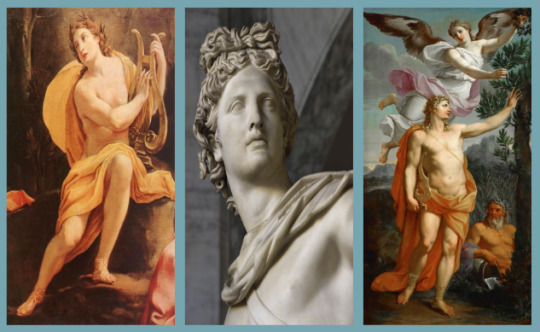
9 notes
·
View notes